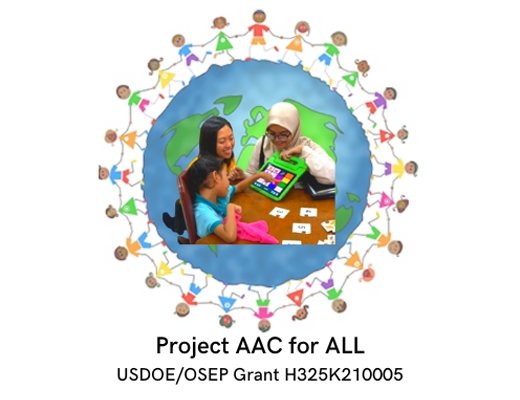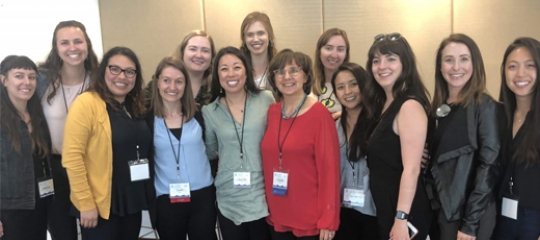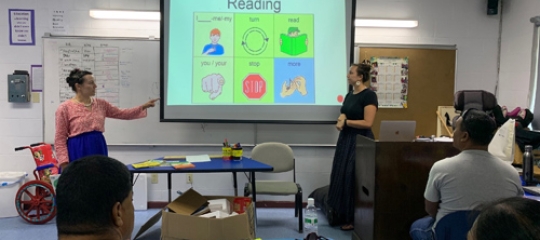Welcome
As defined by the American Speech, Language and Hearing Association, “Augmentative and alternative communication (AAC) is an area of clinical practice that addresses the needs of individuals with significant and complex communication disorders characterized by impairments in speech-language production and/or comprehension, including spoken and written modes of communication.
AAC uses a variety of techniques and tools, including picture communication boards, line drawings, speech-generating devices (SGDs), tangible objects, manual signs, gestures, and finger spelling, to help the individual express thoughts, wants and needs, feelings, and ideas.
AAC is augmentative when used to supplement existing speech, and alternative when used in place of speech that is absent or not functional.
AAC may be temporary, as when used by patients postoperatively in intensive care, or permanent, as when used by an individual who will require the use of some form of AAC throughout his or her lifetime (ASHA).”
For more information on AAC, see:
The Department of Speech, Language and Hearing Sciences (SLHS) at SF State is committed to preparing professionals with a strong background in culturally-responsive AAC practices. AAC Studies in SLHS include coursework, clinical practicum, graduate specialization and research.
SLHS 663: Augmentative and Alternative Communication. Undergraduate students in the Bachelor of Science Degree in Communicative Disorders at SF State develop basic knowledge of AAC in this course.
SPED 743: Issues in AAC and SPED 746: Teaching Individuals with Physical and Other Health Impairments: SLHS graduate students in the Master of Science degree in Communicative Disorders are also required to complete at least one of the above AAC courses.
Both SLHS undergraduate students and graduate students have opportunities for clinical experience to provide AAC services with children and adults in one of two specialized clinics in the Nicholas J. Certo Speech and Language Clinic on the SF State campus.
AAC Adult Conversation Club: The AAC Conversation Club is designed for adults who use AAC systems that include both low and high-tech modalities who seek opportunities to expand their communication skills. See the AAC Adult Conversation Club and contact Sarah Leslie at sleslie@sfsu.edu for more information.
AAC Storytellers' Club: The AAC Storytellers' Club is designed for elementary school-age children who use AAC systems to communicate and learn. See the AAC Storytellers’ Club and contact John Kim at Jkim61@sfsu.edu for more information.
AAC Graduate Certificate. The AAC Graduate Certificate is designed to prepare highly qualified professionals to provide Augmentative and Alternative Communication (AAC) services for children, youth and adults with complex communication needs (CCN) in school and community settings within the context of an interdisciplinary team. See the AAC Graduate Certificate requirements.
Project AAC for ALL: Project AAC for ALL is funded by the US Department of Education, Office of Special Education Programs from 2021-2026 and co-directed by Drs. Gloria Soto and Nancy Robinson. AAC for ALL is designed to prepare professionals in speech-language pathology and special education to meet the linguistic, academic, and social needs of an increasing number of children with disabilities who have a home language other than English, and benefit from various types of Augmentative and Alternative Communication. Over a five-year period, AAC for ALL will enroll and graduate 50 scholars in the Departments of Speech, Language and Hearing Sciences and Special Education who will receive the AAC Graduate Certificate from the SF State Graduate Division in addition to their respective Master’s Degrees and Credentials. See Project AAC for ALL for more information.
Orthopedically Impairment Added Authorization. The Orthopedically Impairment Added Authorization (OI AA) is designed to prepare credentialed teachers to serve students with physical disabilities related to a range of neuromotor conditions, from birth to 22 years of age in school and community settings. See the Department of Special Education’s OI Added Authorization for more information.
Research opportunities in AAC are available to all graduate students in the SLHS and SPED Departments. Dr. Gloria Soto, with a joint appointment in the Department of Speech, Language and Hearing Sciences and the Department of Special Education, coordinates the Joint Doctoral in Special Education between SF State and the University of California, Berkeley. Dr. Soto leads research that focuses on language development and intervention for children and youth who use AAC, inclusive educational practices, and the provision of AAC services to children from culturally and linguistically diverse backgrounds. Current research projects involve the development of best practices for the equitable provision of AAC services to 'minoritized' students, and the investigation of discourse based interventions on the linguistic skills of children and youth who use AAC. See AAC Research and Publications for more information.
For more information about AAC Studies at SF State, contact: Gloria Soto, Ph.D., gsoto@sfsu.edu or Nancy Robinson, Ph.D., CCC-SLP, nancyr@sfsu.edu.
AAC Highlights

Project AAC for ALL
Project AAC for ALL is co-directed by Drs. Gloria Soto and Nancy Robinson in the Department of Speech-Language and Hearing Sciences and funded by the U.S. Department of Education, Office of Special Education Programs from 2021-2026, grant number H325K210005. AAC for ALL will address the shortage of professionals in speech-language pathology and special education to meet the linguistic, academic, and social needs of an increasing number of children with disabilities who have a home language other than English, and benefit from various types of Augmentative and Alternative Communication. AAC for ALL will enroll 12-13 scholars annually who are current graduate students in the Departments of Speech, Language and Hearing Sciences and Special Education for a total of 50 scholars over 5 years. Scholars will receive scholarships and complete an interdisciplinary program over 3 semesters that includes specialized coursework, clinical and fieldwork experiences; service-learning; and internships or student teaching. Upon completion of AAC for ALL, scholars will receive the AAC Graduate Certificate from the SF State Graduate Division in addition to their respective Master’s Degrees and Credentials.


